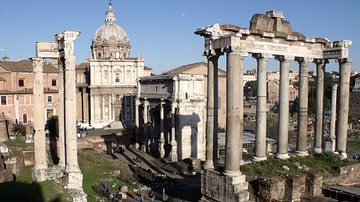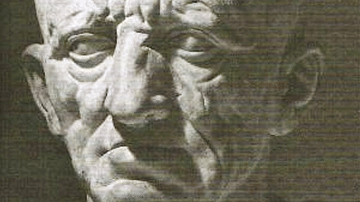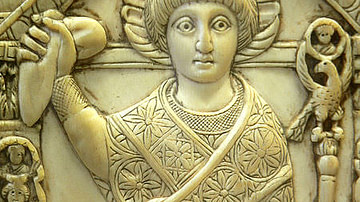
Tribune was a title of various offices in ancient Rome, the two most important of which were the tribuni plebis and tribuni militum. The military tribunes were responsible for many administrative and logistics duties, and could lead a section of a legion under a consul, or even command one alone on the battlefield. The tribuni plebis wielded great political power as they effectively ran the popular assembly of Rome, proposing bills to vote on and able to personally veto senatorial legislation.
Tribuni Aerarii
The original tribuni aerarii were treasury officials responsible for collecting the tax paid to the Roman republic by its citizens, the tributum. They then redistributed the funds to pay the legions (stipendium). This treasury function was subsequently abolished, as was the tributum for Roman Italy in the Imperial period. The title tribuni aerarii was resurrected, albeit briefly, when it was used for the third class of jurors from 70 BCE, but Julius Caesar then abolished that use too.
Tribuni Militum
The tribuni militum title goes right back to early Rome when it was used by tribal commanders, the Latin for tribe being tribus. The military rank was created in the 5th century BCE when Rome was at war with the Veii, probably as the two consuls were not sufficient to command a larger army. Thus, the rank of tribuni militum consulari potestate was formed with consular powers. Initially, there were three such tribunes and then six.
In the Republican period, tribune denoted a senior army rank for which a minimum of five years service was required and members were usually equestrians (equites), and more rarely senators. Each legion had six tribunes, and in the Republic, those tribunes assigned to the first four legions formed each year were voted into office by the popular assembly. The tribunes of the other legions were selected by the commander. In the Imperial period, a single legion still had six tribunes, but one was always of senatorial rank (tribunus laticlavius) while the others were equestrians (tribuni angusticlavii).
In the field, two of the tribunes were selected by daily rotation to command under the consuls. A tribune in the Republic might command alone a part of or an entire legion for one or two months, but their leadership role was diminished by the introduction of senatorial legates from the 2nd century BCE. Tribunes often commanded a cohort of the urban troops, and in the late Empire period, the title was more widely assigned to include officers of the legions, Praetorian Guards, auxiliary troops, vexillations (specialised and temporary task forces) and the Vigiles - Rome's permanent firefighting force.
An additional type of military tribune was the tribuni celerum. In the early years of Rome, they were cavalry commanders. They also participated in the rituals which accompanied the beginning and end of the campaign season.
As officers, tribunes wore finer armour and a cloak (paludamentum) which distinguished them from ordinary legionaries. Tribunes had many administrative and logistics responsibilities, which included management of the legionaries' food supply, their general health, and the overall security of the legion's camp – choosing each night, for example, the night watch and the camp password. Tribunes also raised new recruits and administered justice, including court-martials, where the tribune could impose fines, reduce pay, order corporal punishment, and declare the death penalty for soldiers guilty of offences against army regulations. To assist him in his tasks a tribune had a number of clerical assistants (principales and librarii) to prepare reports, records, and rosters.
Tribuni Plebis
According to tradition the first tribunes of the plebs were created in 494 BCE in order to serve the comitia plebis tributa, Rome's assembly of the plebs (the ordinary citizens who were not members of the aristocratic patrician class). The title may derive from, and so the role was assigned to, the city's first tribal leaders although the office of tribuni militum was already in existence. The initial number is also unclear and was between two and five. More certain is that there were ten tribunes by 449 BCE.
The tribunes, who had to be plebs themselves, were the officers of the popular assembly. In this capacity, they assembled the plebs (ius agendi cum plebe), proposed bills to be voted upon, and passed binding resolutions (plebiscites), at first on the plebs only and then, from 287 BCE with the lex Hortensia, on all Roman citizens. Besides passing legislation necessary for the state to function and reflecting the will of the Senate, tribunes could also propose their own bills. Another function was to conduct public prosecutions before the assembly (iudicia populi). These could be against individuals accused of such crimes as bribery (ambitus) or treason (perduellio). Penalties decided by the tribunes ranged from fines to execution.
Tribunes protected the plebs from any abuses by magistrates. In return, the plebs swore an oath (lex sacrata) which gave the tribunes a sacred inviolability (sacrosanctitas) and a guarantee that the plebs would protect them with their own lives. Further powers were awarded to the tribunes and these included:
- coercitio - the right to impose his will on and redress an insult from any individual through the use of fines, imprisonment, corporal punishment, or the death penalty.
- intercessio – to block or veto any legislation, decrees, or actions by the Senate or from any magistrate and fellow tribune he considered contrary to the interests of the plebs.
- ius auxilii - the protection of plebs from arbitrary punishment unlawfully threatened by a magistrate.
From the mid-2nd century BCE, a tribune, after holding office, was entitled to join the Senate. The powers of the tribunes to sway legislation became so great, especially following their practice of forming a partnership with generals in the Roman army, that Sulla reduced their ability to propose new bills, block the Senate's proposals, and qualify themselves for the Senate in 81 BCE. However, popular and sustained unrest in protest at these measures led to the tribune's full powers being reinstated in 70 BCE. The tribunes had consistently fought against the upper classes in the 2nd and 1st century BCE and gained a reputation for being revolutionaries inside the state apparatus. As the contemporary historian, Polybius stated, "they are bound to do what the people resolve and chiefly to focus upon their wishes" (Hornblower, 1505). Defending public accountability and the interests of the ordinary people, it is no surprise then that, in the Imperial period, the tribunes were finally reduced to a negligible political role by Augustus, who took on most of their powers himself, the tribunicia potestas.






